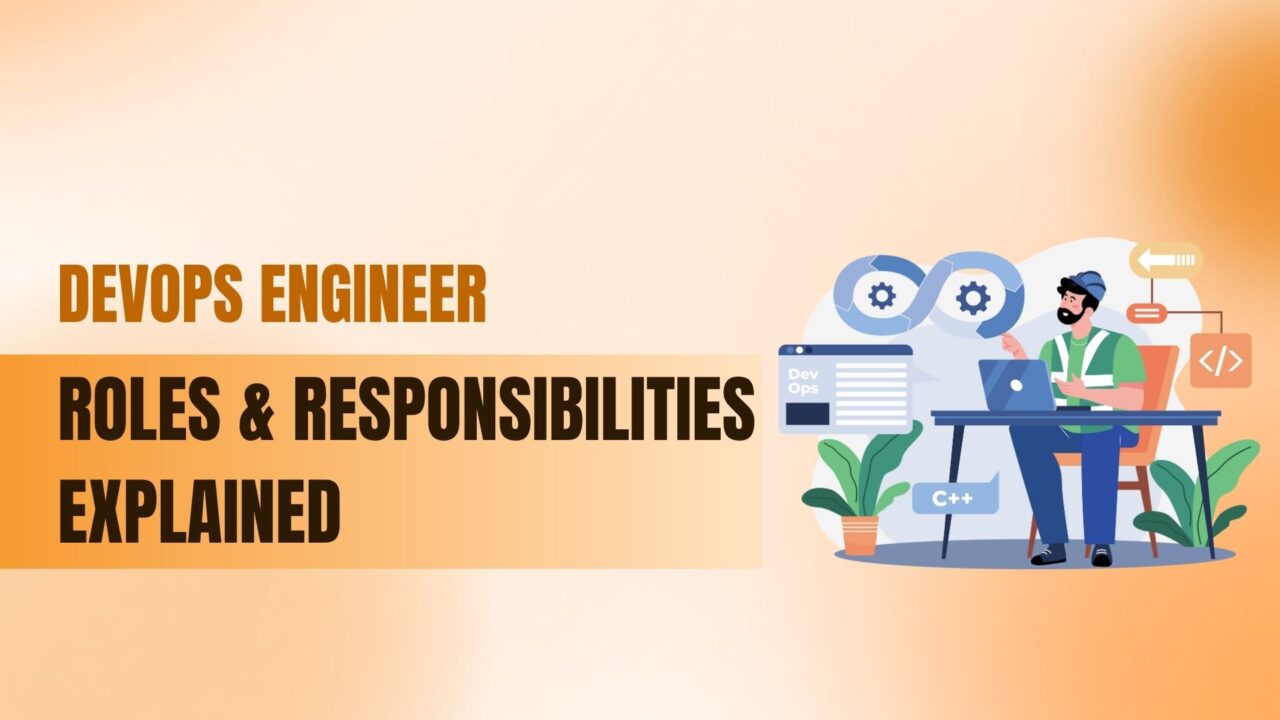The DevOps model has become a foundational element in contemporary software development, enabling organisations to deliver applications and services with greater speed, reliability, and consistency. By aligning development and operations through shared practices and tooling, DevOps helps reduce deployment risks, improve system resilience, and shorten delivery cycles.
Within this framework, the DevOps engineer plays a pivotal role acting as the bridge between development teams and operational workflows. As DevOps practices continue to mature across industries, a clear understanding of the DevOps engineer’s roles and responsibilities is critical for building cohesive, high-performing engineering teams.
This article provides a detailed examination of the core functions, day-to-day activities, technical and soft skills, and challenges associated with the DevOps engineer role.
Key Takeaways:
- DevOps engineers integrate development and operations, enabling rapid, reliable software delivery through automation, collaboration, and process optimisation.
- Key responsibilities include CI/CD management, infrastructure as code, monitoring, and security enforcement across cloud-native environments.
- Proficiency in tools like Git, Jenkins, Docker, Kubernetes, and Terraform is essential to ensure consistency, scalability, and deployment efficiency.
- Partnering with DevOps hiring experts ensures access to top talent, customised solutions, and faster ramp-up for cloud-native and high-performance engineering teams.
What is a DevOps Engineer?
The term DevOps engineer refers to a multidisciplinary professional responsible for integrating development and operations teams to facilitate faster, more reliable, and continuous delivery of software. Positioned at the intersection of coding, infrastructure management, automation, and collaboration, DevOps engineers help eliminate barriers between software development and IT operations.
They work across the full software lifecycle, from planning and development to deployment, monitoring, and incident response. Their role requires both technical proficiency and a deep understanding of operational processes, allowing them to design workflows that support scalability, security, and system resilience.
The Rise of DevOps in Modern Software Development
As software systems become increasingly complex, traditional development and operations models struggle to keep pace. DevOps has emerged as a response to these limitations, supporting more agile, scalable, and collaborative delivery frameworks.
Key drivers behind the rise of DevOps include:
- Shift from monolithic to microservices architectures requiring distributed development and deployment strategies.
- Adoption of agile and continuous delivery practices to enable shorter release cycles and faster innovation.
- Increased use of cloud-native technologies such as containers, Kubernetes, and serverless computing.
- Demand for integrated roles that can manage both application code and infrastructure with equal proficiency.
- Need for greater collaboration between development, operations, and security teams to reduce risk and downtime.
- Focus on automation and observability to support reliability, performance, and rapid issue resolution.
As a result, the DevOps engineer has become central to modern software teams, helping organisations deliver with both speed and stability.
Given this shift in how software is built and delivered, the responsibilities of DevOps engineers have expanded significantly. To understand their impact, it is important to examine the key roles they perform across the software delivery lifecycle.
Key Roles of a DevOps Engineer
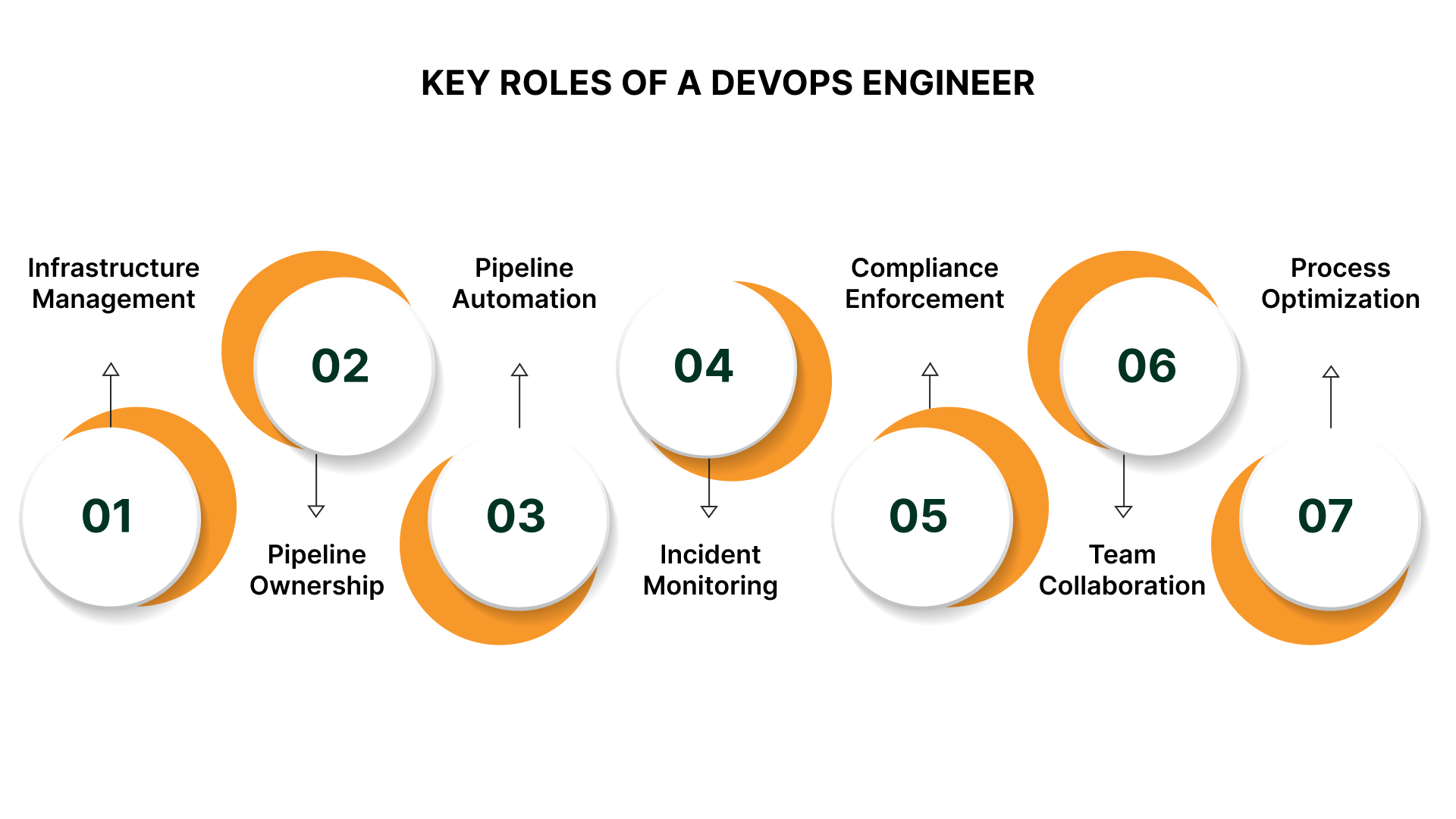
A DevOps engineer plays a multi-dimensional role in aligning development and operational workflows to create a high-performing, scalable, and secure delivery pipeline.
Below is a detailed breakdown of the key roles typically handled by a DevOps professional.
A. Infrastructure as Code (IaC) & Environment Management
One of the most foundational responsibilities of a DevOps engineer is to manage infrastructure using code. This approach known as Infrastructure as Code (IaC) allows environments to be defined, provisioned, and modified through declarative or scripted configuration, rather than manual intervention.
- Provisioning and Configuration: DevOps engineers build and maintain cloud or on-premise infrastructure by writing templates and configuration files using tools such as Terraform, CloudFormation, and Ansible.
- Consistency Across Environments: They ensure that development, staging, and production environments mirror each other in setup, reducing “it works on my machine” issues and deployment inconsistencies.
- Scalability and Version Control: IaC makes it possible to version infrastructure, roll back to previous states, and scale systems programmatically in response to demand.
B. CI/CD Pipeline Ownership
DevOps engineers are responsible for architecting and managing the Continuous Integration and Continuous Deployment (CI/CD) pipelines that automate code testing and delivery. These pipelines form the backbone of modern software development and release cycles.
- Design and Implementation: They define workflows that trigger automated builds, test cases, quality checks, and deployments for every code commit or pull request.
- Safe, Incremental Deployments: These pipelines are structured to support frequent releases while reducing the risk of introducing defects into production.
- Tool Ecosystem: Depending on the organisation’s stack, tools such as Jenkins, GitLab CI, CircleCI, or Bamboo are utilised to integrate code continuously and deploy it efficiently.
Need engineers who can architect resilient CI/CD workflows at scale? V3 Staffing connects you with CI/CD specialists experienced in tools like Jenkins, and GitLab who are ready to drive automation in your stack.
C. Automation Across the Pipeline
Automation is critical to speed, reliability, and scale. DevOps engineers eliminate manual steps across the software delivery lifecycle to reduce human error and accelerate feedback loops.
- End-to-End Automation: From automated builds and testing to deployment, monitoring, and rollback, DevOps engineers create fully automated workflows.
- Script Development: They write scripts to handle repeatable infrastructure tasks, reducing dependency on manual configurations or intervention.
- Containerisation and Orchestration: Tools like Docker and Kubernetes are used to automate the packaging, deployment, and scaling of applications in consistent and reproducible environments.
- Configuration Management: Solutions like Puppet and Chef help manage system states and enforce standardisation across environments.
D. Monitoring, Observability & Incident Management
Maintaining system health is a key responsibility. DevOps engineers build and manage observability frameworks that provide visibility into application performance and infrastructure behaviour.
- Instrumentation and Logging: They set up logs, dashboards, and alert systems using tools such as Prometheus, Nagios, Datadog, and Splunk.
- Incident Response: When incidents occur, they are involved in troubleshooting, resolving issues, and conducting root cause analyses.
- Uptime and SLA Management: By responding to alerts and performance anomalies quickly, they help minimise downtime and meet service-level objectives.
E. Security and Compliance Enforcement
Security is not treated as an afterthought in DevOps; rather, it is integrated directly into the pipeline. DevOps engineers help organisations adopt DevSecOps practices that embed security into the software lifecycle.
- Vulnerability Detection and Remediation: They integrate tools that automatically scan code, containers, and infrastructure for vulnerabilities.
- Secrets and Credential Management: Managing access tokens, SSH keys, and API secrets securely is a critical responsibility, often using tools like HashiCorp Vault or AWS Secrets Manager.
- Policy and Compliance: DevOps engineers ensure systems comply with security and regulatory standards such as SOC 2, ISO 27001, and GDPR, by automating audit trails and enforcing policy-as-code.
F. Collaboration, Culture & Coaching
Beyond technical duties, DevOps engineers are instrumental in shaping team culture and driving cross-functional collaboration.
- Advocacy for DevOps Practices: They act as champions for DevOps methodologies including sharing knowledge, promoting cultural change, and encouraging a mindset of shared ownership.
- Cross-Team Collaboration: A major part of the role involves working closely with developers, QA engineers, operations staff, and security teams to align priorities and resolve bottlenecks.
- Training and Mentorship: Senior DevOps professionals often lead workshops, lunch-and-learn sessions, or internal training to build team capability and improve onboarding for junior engineers.
- Culture of Learning and Blamelessness: They create a psychologically safe environment where experimentation is encouraged and mistakes are treated as learning opportunities.
Also Read: Empathy in Creating a Supportive Workforce: A Trait You Shouldn’t Ignore
G. Process Optimisation and Continuous Improvement
DevOps engineers continuously evaluate delivery processes to identify inefficiencies, reduce waste, and drive measurable improvements in speed and quality.
- Reducing Manual Work: They identify and eliminate repetitive or low-value manual tasks through automation and process redesign.
- Technical Debt Management: Collaborating with development teams, they help prioritise and resolve technical debt that may hinder scalability or performance.
- Feedback-Driven Improvement: Engineers analyse metrics, incident reports, and user feedback to refine tools, practices, and workflows ensuring that engineering delivery stays aligned with business goals.
While roles define the scope of a DevOps engineer’s contribution, their responsibilities reflect how these functions are carried out day-to-day. The following section outlines what this looks like in practice.
Struggling to find DevOps talent who can handle both code and infrastructure seamlessly? V3 Staffing connects you with cloud-native professionals who bring deep expertise in CI/CD, IaC, and security ready to contribute from day one.
The Responsibilities of a DevOps Engineer
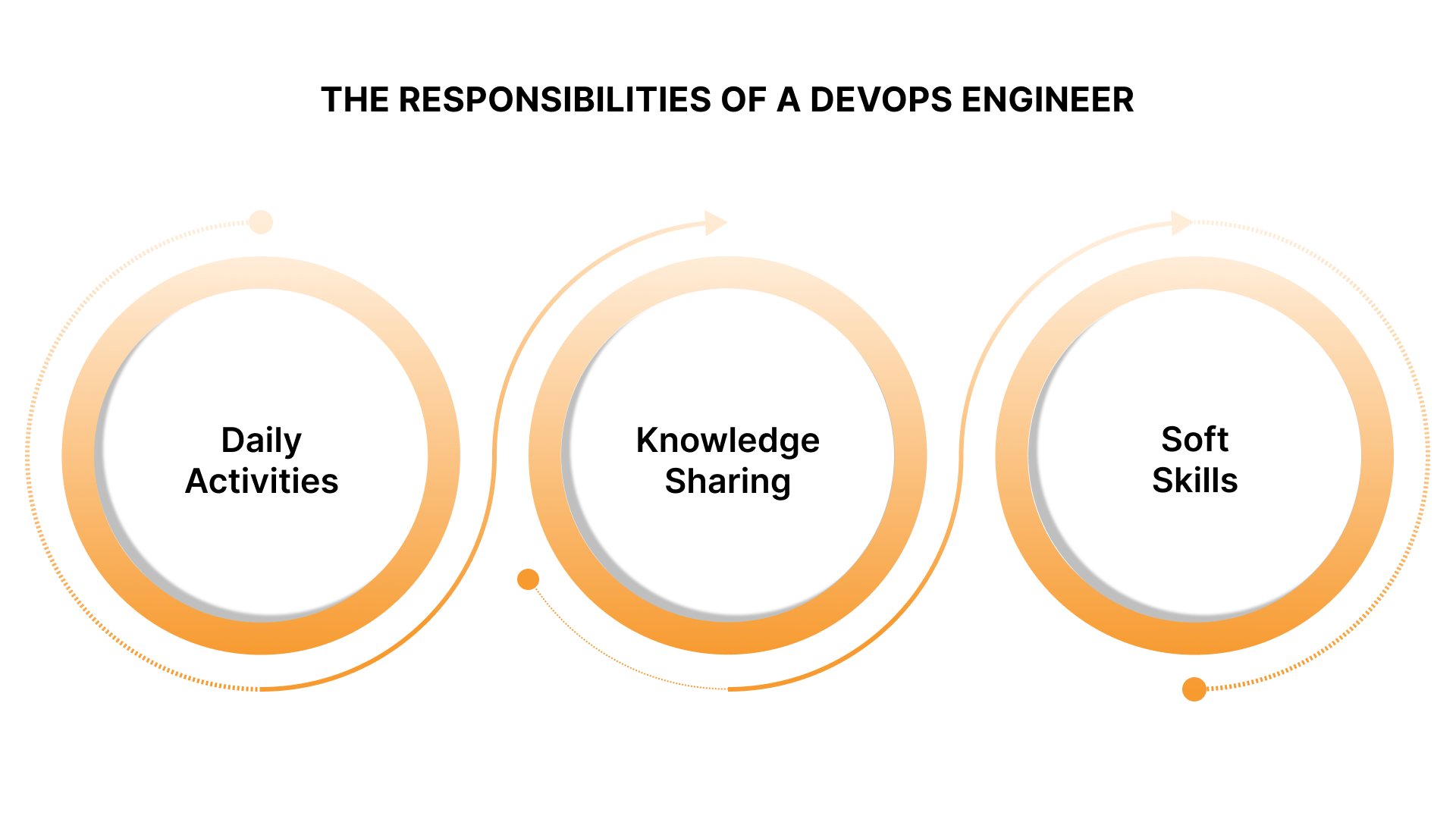
While the roles of a DevOps engineer define the broader scope of their contribution, their day-to-day responsibilities provide practical insight into how they support stable, scalable, and high-performing systems.
A. Sample Daily and Weekly Activities
DevOps engineers operate at the centre of software delivery and infrastructure reliability. Their routine tasks vary depending on the environment, but typically involve a combination of operational support, automation efforts, and team collaboration.
- Cross-Team Coordination: Actively participating in daily stand-ups, sprint planning sessions, and retrospectives to stay aligned with development, QA, and operations teams.
- Incident Response: Addressing system alerts and production issues promptly to maintain system health and minimise downtime.
- Release Management: Overseeing deployments, validating successful releases, and rolling back changes when necessary to prevent service disruptions.
- Documentation Workflows: Writing and updating essential documentation such as deployment guides, system runbooks, and standard operating procedures to support operational continuity.
- Code and Configuration Review: Evaluating automation scripts, infrastructure-as-code templates, and CI/CD workflows to maintain quality and compliance with security and operational standards.
B. Documentation and Knowledge Sharing
Clear documentation and structured knowledge transfer are essential for maintaining transparency and operational readiness, especially in dynamic environments with multiple stakeholders.
- Up-to-Date Documentation: Maintaining comprehensive documentation for infrastructure configurations, deployment steps, rollback procedures, and monitoring setups.
- Runbooks and Troubleshooting Guides: Creating practical guides to resolve common issues, enabling quicker incident response and smoother onboarding for new team members.
- Post-Incident Analysis: Documenting root causes, lessons learned, and action points from system outages or failures to strengthen future responses and prevent recurrence.
- Operational Readiness: Ensuring the wider engineering team can access accurate, actionable information when responding to incidents or performing critical deployments.
C. Essential Soft Skills and Teamwork
Beyond technical skills, DevOps engineers must exhibit strong interpersonal and leadership qualities. Their ability to collaborate effectively across disciplines is critical to the success of DevOps practices.
- Effective Communication: Working closely with developers, testers, security professionals, and operations staff to coordinate workflows and share insights.
- Cross-Functional Collaboration: Breaking down silos by encouraging open dialogue between departments and aligning stakeholders on common goals.
- Mentorship and Upskilling: Supporting the growth of junior engineers by conducting internal training sessions, brown-bag talks, or shadowing opportunities.
- Cultural Leadership: Promoting a learning-oriented, non-blaming culture through postmortems, retrospectives, and experimentation-driven improvements.
- Proactive Problem-Solving: Taking initiative to investigate issues, raise concerns, and implement improvements before problems escalate into production outages.
With a wide range of responsibilities spanning development, operations, security, and collaboration, DevOps engineers must rely on the right set of tools to execute these functions effectively.
Tools and Technologies Utilised by DevOps Engineers
To execute their responsibilities effectively, DevOps engineers rely on a specialised set of tools that support automation, collaboration, and operational resilience across the software delivery pipeline.
| Category | Examples | Purpose |
| Version Control Systems | Git, SVN | Manage code versions and support collaboration & rollbacks |
| CI/CD Platforms | Jenkins, GitLab CI, CircleCI | Automate testing, integration, and deployment |
| Configuration Management | Ansible, Puppet, Chef | Standardise environments using Infrastructure as Code (IaC) |
| Containerisation & Orchestration | Docker, Kubernetes | Deploy applications in scalable, portable containers |
| IaC Tools | Terraform, CloudFormation | Provision infrastructure consistently across environments |
| Monitoring & Logging | Prometheus, Datadog, ELK Stack | Monitor performance and detect issues |
| Collaboration Tools | Slack, Jira, Microsoft Teams | Enable transparent, real-time communication across teams |
While these tools improve speed, consistency, and scale, DevOps engineers must still navigate a range of operational and organisational challenges in real-world environments.
Also Read: Key Niche Skills That Are Revolutionising the IT Industry
Common Challenges DevOps Engineers Face
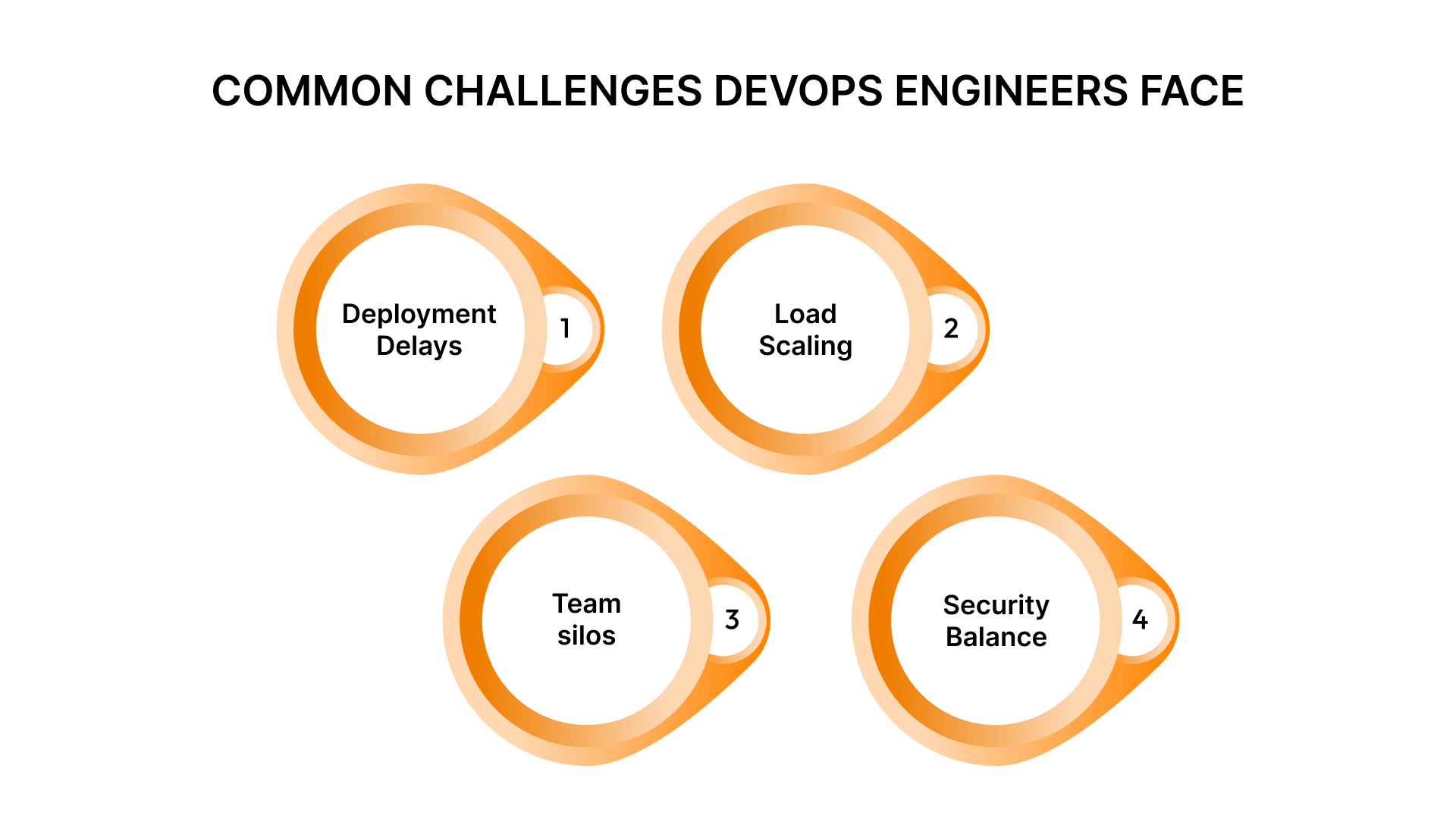
Despite their expertise, DevOps engineers operate in high-pressure, dynamic environments that present a distinct set of challenges:
- Deployment bottlenecks and downtime: Manual steps and disconnected tools can slow down deployments, leading to outages and poor user experience.
- Scaling under load: As usage grows, infrastructure must scale efficiently using auto-scaling, load balancing, and capacity planning.
- Team silos: Lack of coordination between development, QA, operations, and security teams causes delays. DevOps engineers align workflows and improve collaboration.
- Balancing security and speed: DevOps engineers embed security practices like vulnerability scanning and secrets management to maintain safety while keeping delivery fast.
While these challenges are significant, they are not insurmountable. Skilled DevOps engineers apply targeted strategies to address them effectively and sustainably.
Are your DevOps initiatives stalled by slow hiring cycles or lack of specialised talent? V3 Staffing helps you close critical skill gaps fast with SLA-driven recruitment solutions customised for high-demand roles like SREs, Automation Engineers, and Platform Architects.
How DevOps Engineers Solve These Challenges
To overcome the complexities of modern software delivery, DevOps engineers employ a combination of technical expertise, strategic automation, and cross-functional coordination. Their solutions are proactive and rooted in continuous improvement.
- Automating and Optimising CI/CD Pipelines: By simplifying continuous integration and delivery workflows, DevOps engineers eliminate manual steps that cause delays or errors. This not only reduces deployment bottlenecks but also ensures greater reliability and consistency across releases.
- Auto-Scaling and Performance Tuning: Utilising cloud-native tools and monitoring insights, engineers configure auto-scaling policies and performance parameters to adapt infrastructure dynamically based on workload demands ensuring systems remain responsive under varying traffic loads.
- Enhancing Collaboration Across Teams: DevOps engineers promote regular communication and shared accountability between development, QA, security, and operations. This reduces siloed working, accelerates feedback loops, and aligns all stakeholders on common delivery goals.
- Embedding Security into Delivery Pipelines (DevSecOps): Security is treated as a shared responsibility. Engineers integrate vulnerability scans, secrets management, and compliance checks into automated pipelines making it possible to deploy rapidly without compromising safety or regulatory standards.
DevOps engineers tackle challenges by automating workflows and promoting collaboration between development and operations teams. Their expertise ensures faster, more reliable software delivery and improved system stability.
Also Read: Recruiting for Cultural Fit vs. Skills: Striking the Right Balance
How V3 Staffing Supports DevOps Engineer Hiring
V3 Staffing delivers specialised recruitment services customised to the evolving needs of DevOps hiring. With presence in Hyderabad, Bengaluru, Chennai, Pune, Delhi NCR, and Mumbai, we connect organisations with skilled professionals capable of managing modern infrastructure, automation pipelines, and continuous delivery frameworks.
By utilising dedicated sourcing teams and flexible delivery models, V3 Staffing enables companies to secure DevOps talent swiftly and at scale. This applies whether for short-term cloud transformation projects or long-term platform reliability initiatives. Our services span IT Staffing, Contractual Hiring, Permanent Recruitment, and RPO offering comprehensive support to high-growth companies, product firms, GCCs, and engineering-led enterprises.
Key advantages of partnering with us:
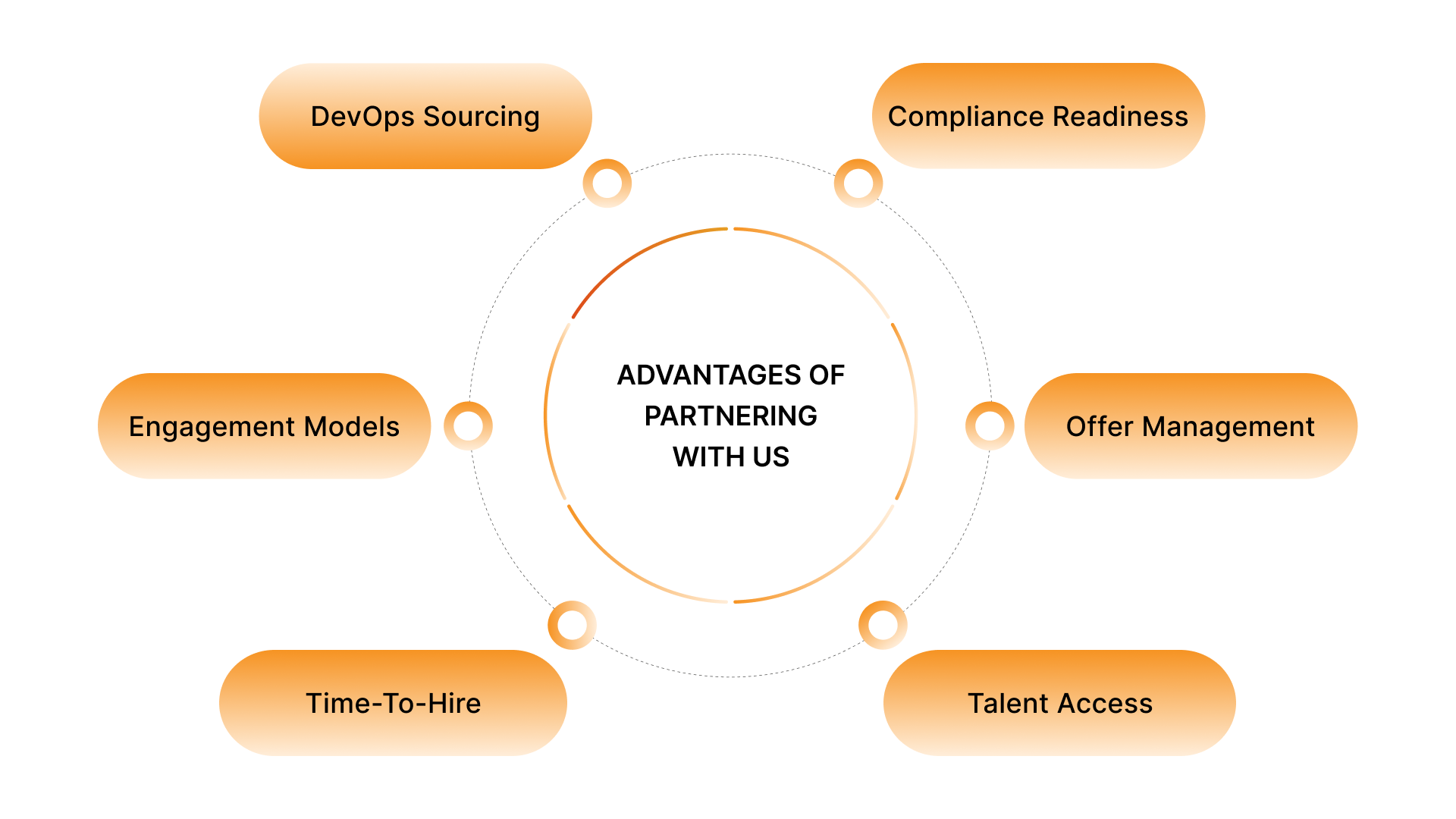
- Targeted DevOps Talent Sourcing: Industry-specific recruiters with deep networks in cloud, infrastructure, and automation help identify candidates aligned to CI/CD, IaC, and DevSecOps practices.
- Flexible Engagement Models: Contract, permanent, and RPO services allow businesses to ramp up or optimise their DevOps hiring based on delivery timelines and technical depth.
- Reduced Time-to-Hire: Established pipelines and role-specific screening drastically cut hiring cycles for in-demand roles such as SREs, Platform Engineers, and Automation Architects.
- Pan-India Talent Access: V3’s regional delivery capabilities ensure access to DevOps professionals across Tier I and II tech hubs, customised to local cost and skill availability.
- Offer-to-Join Ratio Management: Dedicated post-offer engagement teams ensure high candidate retention and onboarding success critical for continuity in high-impact DevOps roles.
- Compliance and Project Readiness: DevOps engineers are vetted for domain compliance, security orientation, and toolchain familiarity, ensuring they integrate seamlessly into live environments.
Whether you are building a cloud-native team, automating infrastructure, or modernising delivery processes, V3 offers structured, insight-led recruitment that delivers the right talent, at the right time, with the right expertise.
Conclusion
DevOps engineers play a critical role in aligning development speed with operational stability. Their ability to simplify workflows, ensure deployment reliability, and promote cross-functional collaboration is central to modern, scalable software delivery. Recognising this role as strategic, not just technical, is essential to unlocking innovation and agility.
V3 Staffing enables organisations to identify and onboard DevOps professionals with the right mix of technical depth and cultural fit. From mid-level engineers to platform specialists, we support your hiring goals through customised sourcing, domain-specific screening, and SLA-driven fulfilment.
Partner with V3 Staffing to build high-impact DevOps teams that drive engineering excellence and business velocity.
FAQs
1. What are DevOps engineer responsibilities?
DevOps engineers manage infrastructure, automate workflows, implement CI/CD pipelines, monitor systems, enforce security, and ensure smooth deployment. They bridge development and operations to support scalable, high-performing, and reliable software delivery.
2. What are the skills of a DevOps engineer?
DevOps engineers need expertise in scripting, cloud platforms, containerisation (Docker, Kubernetes), IaC tools (Terraform, Ansible), CI/CD, and monitoring. Strong collaboration, problem-solving, and adaptability are equally critical soft skills.
3. What are the main responsibilities of DevOps in developing flow?
In the development flow, DevOps focuses on automating integration, testing, and deployment, maintaining environment consistency, improving release frequency, and ensuring system reliability through continuous monitoring and rapid incident resolution.
4. What do DevOps do daily?
DevOps professionals automate deployments, monitor systems, manage CI/CD pipelines, troubleshoot issues, and collaborate with development and operations teams to ensure fast, reliable software delivery.
5. What are the 7 principles of DevOps?
The 7 core principles of DevOps are: customer-centric action, create with the end in mind (end-to-end responsibility), continuous improvement, automate everything you can, collaborate across silos, embrace systems thinking, and lean processes. These principles guide DevOps teams toward efficient, high-quality software delivery.
6. Does DevOps need coding?
Yes, coding is essential in DevOps for scripting automation tasks, building CI/CD pipelines, and managing infrastructure as code. While not as intensive as full-time development, knowledge of languages like Python, Bash, or YAML is important to automate processes and integrate tools effectively.

